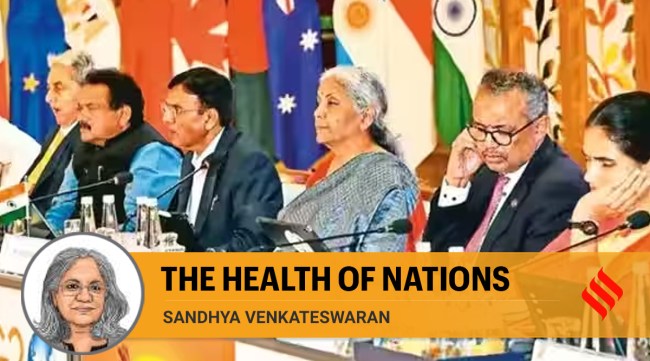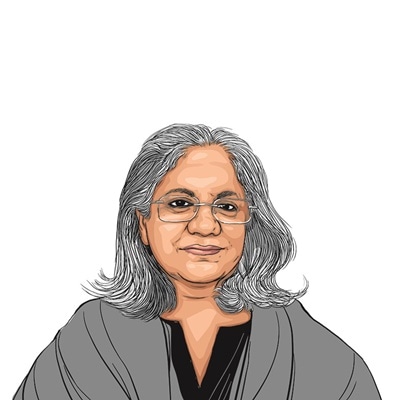Opinion G20’s inclusive thrust should extend to global governance on health issues
The inability of global governance to impose checks and balances to ensure that the needs of less endowed countries are served is worrying.
 Health is today a political priority and is linked with economic interests and international relations (File Photo)
Health is today a political priority and is linked with economic interests and international relations (File Photo)
With the second of the successive G20 presidencies from the Global South ending on a successful note, this is an opportune time to examine the extent to which the Global South is prioritised when development issues and foreign policy intersect. India’s presidency has done a great job of including the Global South. Now is the time to interrogate how that inclusion takes place in letter and spirit.
Let us take the case of health. Foreign policymakers’ interest in global health is not new and has grown with globalisation. The Covid-19 pandemic highlighted the impact of health issues on national security, economics and international cooperation. Health is today a political priority and is linked with economic interests and international relations. Where then are equity issues positioned when global health and foreign policy come together? Will health be a tool to protect national interests or can foreign policy be driven by global altruism?
Several global commitments and frameworks have been set out in the past. Adherence to these is influenced by the overlap of different policy priorities; action on universal and equitable responses depends on the ability of global governance to ensure that national interests balance global concerns.
The ideal role of global health governance lies in ensuring universal and equitable access to health infrastructure and medical supplies, and adequate and timely financing. It must also guarantee that the research and development (R&D) agenda does not neglect areas with little commercial benefit, that there is a geographical balance in R&D and manufacturing, and research output is made available to southern countries.
The poor report card of national governments in collective responsibility and collaboration during the Covid pandemic suggests that global leadership and governance is a work in progress. National interests took priority over collective action during the pandemic. Richer countries pre-ordered almost half the vaccine production capacity in the early stages of the crisis.
The US and Europe stopped the export of N95 masks. The Access to Covid-19 Tools Accelerator (ACT-A) — a G20 initiative to promote access to vaccines, tests and treatments — did not fulfil its mandate sufficiently. COVAX was unable to mobilise commitment and funds for vaccines from high-income countries, constraining timely procurement. The availability of $10 billion to the COVAX AMC in March 2020, instead of June 2021, could have enabled vaccine equity much earlier.
It is not that the world lacks equity targeted frameworks. The International Health Regulations Legal Framework (post-SARS) focuses on countries’ rights and obligations in health emergencies, the Pandemic Influenza Preparedness Framework (post the H1N1 pandemic) deals with increasing access to vaccines for developing countries and the WHO’s Health Emergencies Programme (post-Ebola) is concerned with data and standard setting.
Yet, the world seemed unprepared to tackle Covid and less developed countries struggled on multiple fronts.
Lessons from recent and previous events point to governance gaps. The absence of one decision-making authority and the lack of clarity in the roles of governments and organisations have combined to create accountability challenges. The dominance of select countries in global governance institutions has meant that the interests of a large part of the world are not served.
Geopolitics and domestic politics around nationalistic and populist agendas imply that foreign policy prioritises global health only to the extent that national interests are served. This is not surprising. However, the inability of global governance to impose checks and balances to ensure that the needs of less endowed countries are served is worrying.
Much of past global governance has been criticised for being weakened by the interests of the Global North and undermined by geopolitics. WHO was criticised for its lack of effective leadership. The G20 has been dominated by countries of the North. India’s presidency has moved the needle. But where do the roles of WHO, G20 and other global platforms intersect? Economic and social shifts in the world order have widened and diversified with the participation of actors with varied ideological positions. This has exacerbated the challenges of coordination and joint accountability.
The need for future conventions is to interrogate what is missing from existing frameworks when it comes to balancing national interests with global equity aspirations. Any framework is only as good as its implementation and its responsiveness to all states. National interests have been critical to the success or failure of global agreements, and countries will need to see the value of global equity in their foreign policy goals. Strong and unaligned global governance is critical to ensure that commitments made in global gatherings play out in form and spirit, not only for domestic needs but for global equity. This will require a strong rethink on the type of governance mechanism needed as well as on strengthening existing mechanisms.
The writer is Senior Fellow, Centre for Social and Economic Progress






